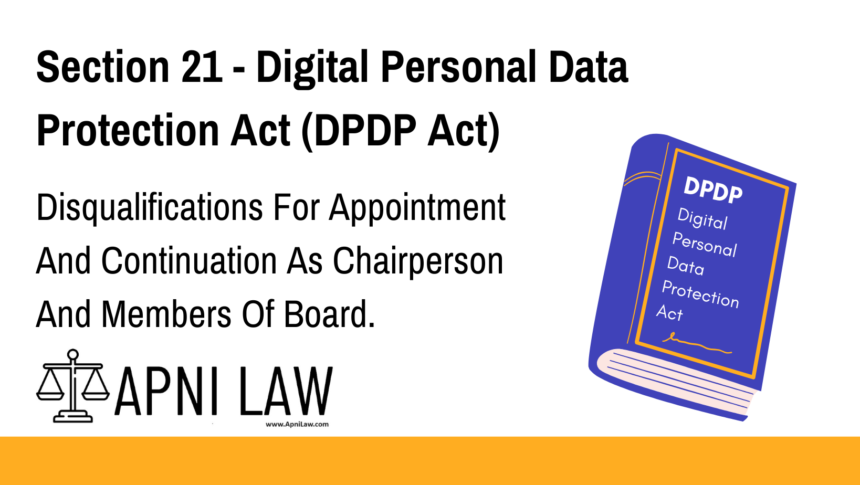Code: Section 21
(1) A person shall be disqualified for being appointed and continued as the
Chairperson or a Member, if she—
(a) has been adjudged as an insolvent;
(b) has been convicted of an offence, which in the opinion of the Central
Government, involves moral turpitude;
(c) has become physically or mentally incapable of acting as a Member;
(d) has acquired such financial or other interest, as is likely to affect prejudicially
her functions as a Member; or
(e) has so abused her position as to render her continuance in office prejudicial
to the public interest.
(2) The Chairperson or Member shall not be removed from her office by the Central
Government unless she has been given an opportunity of being heard in the matter.
Explanation of Section 21 DPDP
Section 21 of the Digital Personal Data Protection Act, 2023 outlines the circumstances under which a person can be disqualified from being appointed or continuing as the Chairperson or a Member of the Data Protection Board.
This section ensures that only individuals of integrity, capability, and independence are allowed to serve on the Board, and protects them from arbitrary removal.
Key Disqualifications:
- Declared Insolvent: If the individual has been legally declared insolvent.
- Criminal Conviction: If convicted of an offence involving moral turpitude, in the opinion of the Central Government.
- Incapacity: If the person is physically or mentally unfit to serve.
- Conflict of Interest: If the person holds financial or other interests that may affect their impartiality.
- Abuse of Position: If they misuse their position in a way that harms public interest.
Fair Removal Process:
Before being removed from office, the individual must be given an opportunity to be heard, thereby ensuring natural justice.
Illustration
Example 1: Conflict of Interest
Ms. A is a Member of the Data Protection Board but also holds a significant stake in a private data analytics firm. The Central Government determines that this could impact her impartiality. Under Section 21(1)(d), she may be disqualified from continuing in office.
Example 2: Opportunity to be Heard
Mr. B, the Chairperson, is accused of abusing his position. However, before the Central Government takes action to remove him, it must provide Mr. B with a chance to present his case as per Section 21(2).
Common Questions and Answers on Section 21 DPDP
1. What are the grounds for disqualification under Section 21?
- Disqualification may occur due to insolvency, conviction of a morally reprehensible offence, physical/mental incapacity, conflict of interest, or abuse of position.
2. Who decides whether a conviction involves moral turpitude?
- The Central Government has the authority to determine whether a conviction involves moral turpitude.
3. Can a Chairperson or Member be removed without a hearing?
- No. Section 21(2) ensures that no removal can happen without providing the individual an opportunity to be heard.
4. Is this section applicable after appointment as well?
- Yes. Section 21 applies both before and after appointment. Even serving Members can be removed if disqualified under the listed grounds.
Conclusion
Section 21 of the Digital Personal Data Protection Act is a critical provision that safeguards the integrity and functioning of the Data Protection Board. By listing clear disqualifications and enforcing due process for removal, it ensures that only competent and unbiased individuals occupy these sensitive roles. This section reinforces public trust in the oversight of data protection governance in India.
For more updates and legal insights into the DPDP Act, visit ApniLaw today 🚀








